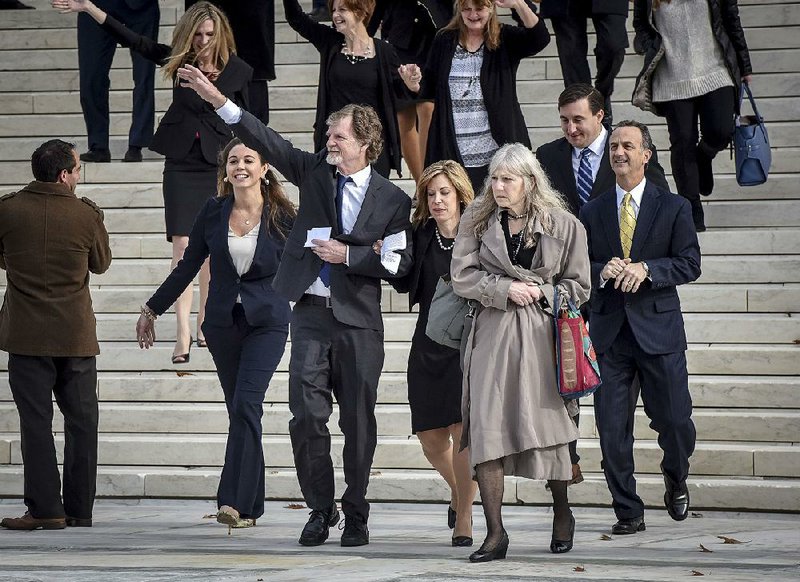WASHINGTON -- Supreme Court justices heard arguments Tuesday over whether the First Amendment protects a Colorado baker who refused to make a wedding cake for a same-sex couple.
Justice Anthony Kennedy, who wrote the court's 5-to-4 decision in 2015 saying gay couples have a constitutional right to marry, speculated about what might happen if a decision in baker Jack Phillips' favor prompted requests for bakers across the country to refuse to make cakes for same-sex couples.
On the flip side, just moments later, Kennedy sharply questioned Colorado Solicitor General Frederick Yarger. The justice seemed offended by a comment made during the deliberations of the Colorado Civil Rights Commission when one commissioner said: "And to me it is one of the most despicable pieces of rhetoric that people can use to -- to use their religion to hurt others."
At one point, Kennedy and some conservative justices raised the possibility that the proceedings against baker Phillips had been infected by bias.
[U.S. SUPREME COURT: More on current justices, voting relationships]
The liberal justices meanwhile worried that an exception for Phillips would gut public accommodations laws that require businesses to serve the public without discriminating because of race, gender, religion and, in the case of Colorado and more than 20 other states, sexual orientation.
Justice Stephen Breyer said the court did not want to "undermine every single civil-rights law."
The court's conservatives were concerned with what Justice Samuel Alito said was a "disturbing record" from the Colorado Civil Rights Commission and the Colorado Court of Appeals, which ruled against Phillips.
That raised the possibility that the case could be returned. But they also seemed sympathetic to Phillips' argument that, as a "cake artist," the law violates his freedom of expression to create a custom cake for a same-sex wedding. His religious beliefs teach that marriage is only between a man and a woman.
David Cole, legal director for the American Civil Liberties Union, which represents the couple, Charlie Craig and David Mullins, acknowledged there were complicated issues but asserted that they did not apply to Phillips' decision that he would not create a cake for the couple.
"All he knew was that they were gay," Cole said.
Several of the liberal justices questioned what other types of business owners would be exempt if the court made an exception for Phillips.
"Who else is an artist?" asked Justice Ruth Bader Ginsburg.
Justice Elena Kagan asked whether a hair stylist, a chef or a makeup artist might also be considered an artist.
Phillips' attorney, Kristen Waggoner, distinguished between the baker's stylized, sculpted creations and the services provided by other professions that she said were "not speech."
"Some people might say that about cakes," responded Kagan.
President Donald Trump's administration filed a brief on behalf of Phillips; supporters of the couple said it was the first time the government has argued for an exemption to an anti-discrimination law.
But the government agreed with Phillips that his cakes are a form of expression and that he cannot be compelled to use his talents for something that he does not support.
U.S. Solicitor General Noel Francisco, representing the Trump administration, told the court Tuesday that the exemption should apply only to a narrow category of business owners who should not be forced to create or contribute to an event they disagree with on the basis of their religious beliefs.
He repeatedly used as an analogy a black artist, who he said should not be compelled to sculpt a cross that would be used for a Ku Klux Klan service.
When asked where to draw the line, he said the justices should ask whether the creation is "predominantly expressive" in its purpose and whether customers are paying a premium for it.
That prompted a lighthearted retort from Justice Neil Gorsuch, who noted that high-priced wedding cakes rarely taste as good as they look.
It was to Francisco that Kennedy posed his question about whether the baker could post a sign in the window notifying potential customers that the shop does not make cakes for same-sex couples and asked whether that would be "an affront to the gay community."
Phillips contends that dual guarantees in the First Amendment -- for free speech and for the free exercise of religion -- protect him against Colorado's public accommodations law, which requires businesses to serve customers equally regardless of "disability, race, creed, color, sex, sexual orientation, marital status, national origin, or ancestry."
Scattered across the country, florists, bakers, photographers and others have claimed that being forced to offer their wedding services to same-sex couples violates their rights. Courts have routinely turned down the business owners, as the Colorado Court of Appeals did in the Phillips case, in which it said state anti-discrimination laws require businesses that are open to the public to treat all potential customers equally.
The case is Masterpiece Cakeshop v. Colorado Civil Rights Commission.
A Section on 12/06/2017
